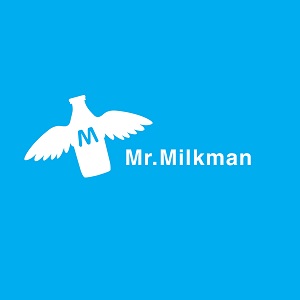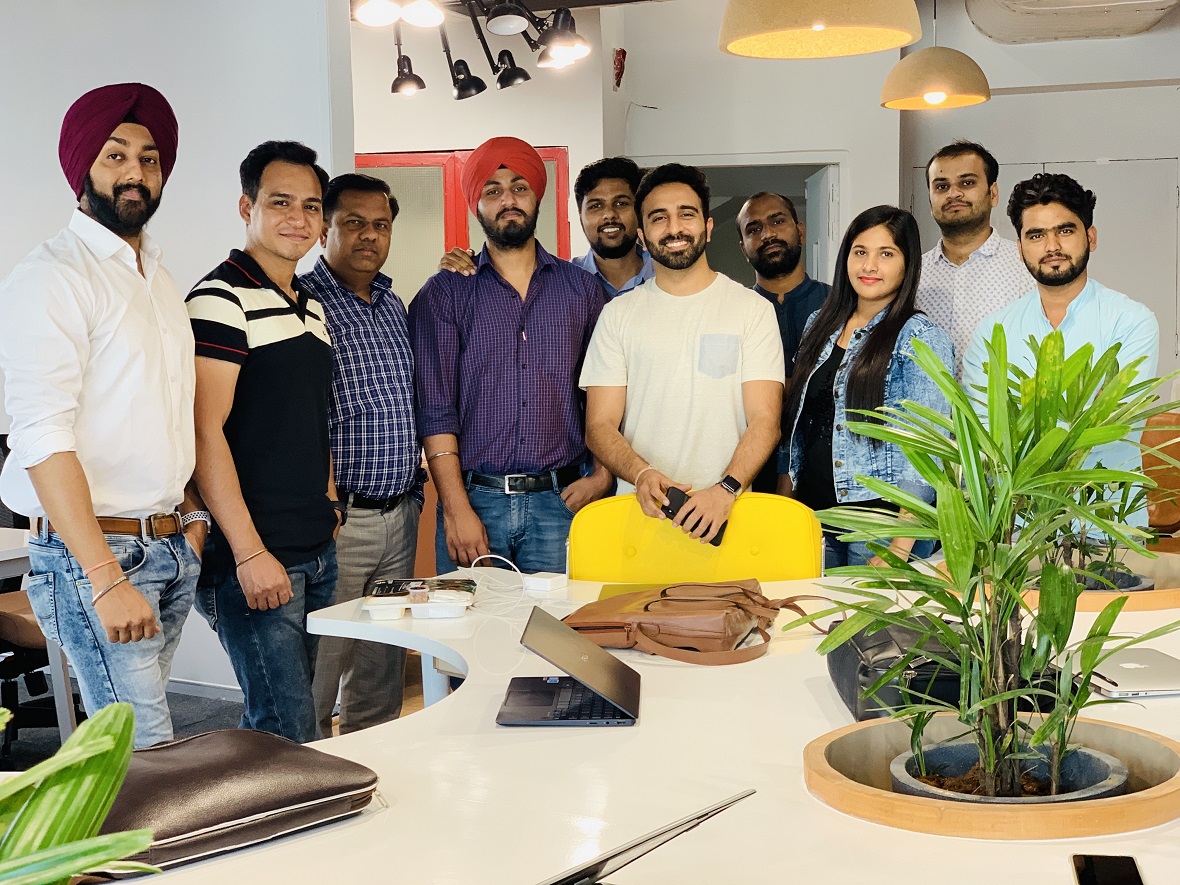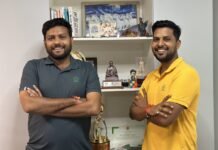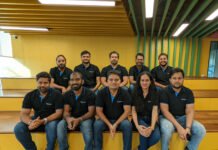Mr. Milkman is a Dairy Tech Start-up working towards enabling the dairy industry with technology and automation. Founded in 2017, Mr. Milkman today works with leading dairies to help them manage their operations from production to consumption.

About the founders
Samarth Setia (C.E.O & Co-Founder) started Mr.Milkman in the final year of his college back in 2015. Mr. Milkman was digitizing the logistics of various dairy companies back then and also owned the logistics around it. In December 2017, Mr.Milkman decided to open its platform which was being used to optimize its own logistics to other dairies across India. Ever since Mr.Milkman has been been focusing purely on its SaaS Platform. Abhishek Goel, a friend of Samarth since college took the leap and left his job at Grey Orange to help scale Mr.Milkman. He joined in January 2019. We are publishing an interview with Samarth:
Q.: What is the problem you are trying to solve?
Ans: In order to organize a largely unorganized sector, Mr. Milkman, a SaaS platform, enables dairies to track product lifecycle, manage operations from production to consumption, track reverse logistics of peripheral items and provides real-time analytics and reports.
In the dairy business, what comes back from the market is just as important as what goes into it. What I mean by that is, there are several components, such as crates, returned milk, glass bottles, etc., which are sent back to the dairies or milk brands. Mr. Milkman also helps manage the reverse logistics in these cases. Thus, from forecasting production to tracking damages and managing reverse logistics, Mr. Milkman takes care of it all. Apart from this, it also aids the automation of processes like the generation of orders which are set to go to distributors, retail outlets or end consumers. The platform itself can also detect anomalies and notify the sales team of the dairy in case there are any sudden anomalies in the ordering patterns. This helps plug in the problem of unnoticed losses for our clients.
Q.: Can you share with us any insights that led you to believe that this is a big enough problem?
Ans: The idea of coming up with my startup came from observing the local milkman who delivered to my house. He had no concrete management of his accounts and would leave it mostly to memory. If there was any change in the delivery schedule or quantity, it would have to be conveyed to him via the building’s security guard, which eventually led to several misunderstandings and incorrect billings. The platform was conceived with a vision to change the perception of the local milkmen to the organized Mr. Milkman. The Platform built for the local milkman evolved to become the platform for dairies when we eventually got to see the entire process. Now it helps dairies to get digital and automate their processes.
It was only when we saw the dairy operations ourselves, that we realised this problem is at a very large scale and hence opens up an opportunity for digitization. Dairy happens to be one of India’s largest sectors.
Q.: Tell us about the Product / Solution. Explain how you went about the Product-Market Fit Process.
Ans: The platform is an on the cloud solution where dairies get to see the data of their operations and also get real time analytics around it.
The platform was designed solely for our operations. In order to understand whether what we had built for ourselves was solving the need of the market, we offered our solution to one of the dairies we were in touch with. When we got great response on the same, we tried this with 2 more dairies who also accepted the platform happily. Their feedback on the platform allowed us to make the product better and suitable for all type of dairies across India.

Q.: What is your USP?
Ans: The dairies operating in India have massive scales and massive operations. In order to digitize the same, they required a ready platform which acted as a plug and play rather than develop something themselves. Also, most platform in a SaaS model were very generic and not designed specifically with dairy as the core product. Our platform is designed specifically for the dairy and designed with the help of the dairies using it. This allowed us to understand the sector much better and add functionalities that solves their problems in unique manner. The platform being a SaaS product also allowed faster go to market, quicker adoption and continuous enhancements at a much lower cost. As a platform, we are growing, advancing in terms of technology and introducing new features regularly. Add this to our knowledge derived from other milk brands and dairy, and we can ensure that the clients go to market faster without any additional effort on their part. Furthermore, our platform is cheap and built to scale.
Q.: What were your assumptions when you entered the market, learning that you have? Who in your mind is your ideal customer? Do you have at least one of them signed up?
Ans: When I started out, I knew next to nothing about the dairy industry. The initial product was created with the simple vision of helping the local milkmen and hence was a very basic application, not even a straight-out problem solver. Over time, we got to learn more about the industry and the challenges it was facing due to lack of digitization. The platform eventually evolved into a SaaS product. The learning curve was a difficult one as we required a significant amount of knowledge about the dairy industry. Our clients – though not entirely happy about this – helped us a lot by sharing their knowledge through the feedback of the product. In fact, our clients have become our largest source of on-field knowledge and challenges which we keep implementing into our platform.
Currently, Mr. Milkman has 60+ clients across India with over 1.2 crore litres of milk that gets managed via the platform. Some of the organizations Mr. Milkman has associated are, Milk Mantra, Whyte Farms, Amlaan A2 Milk, Himalayan Creamery, PureMilk, Go4Life, Milk Valley Farms, Binsar Farms Creamery,Mr.Dairy, Mr.Milk, HappyMilk, Happymoo, Aryaffoods, farm crème etc to name a few.
Q.: What has been your biggest failure as an entrepreneur and what did you learn from it??
Ans: Building any business has its own set of difficulties. I was lucky enough to be able to solve most of them at the nascent stages of the business and have had the support to take care of them. Managing everything alone led to a mess – I was taking care of everything, from client management to addressing technical issues and even the finances. Although this led to some missed client relations, I can confidently say that I learnt a lot from my mistakes. Experience has taught me that having a strong team ensures the betterment of your product. We faced issues with this, as those who were working with us, weren’t aligned to our vision and looked to me for constant guidance and decision making. Hiring smarter team members who are capable of making their own decisions has helped us scale faster! The good thing is that during this growth journey, I have learnt quite a few lessons to help me take this forward in a better manner.
Q.: How are you pricing the Product? What is the logic behind it? What is the model you are following – Free / Freemium / Premium etc.? Explain your thought process.
Ans: We have ensured that the pricing model is a basic one – we charge for the software used on a per litre processed basis, via the platform. Certain features over and above this are chargeable. This way our clients do not have to worry about any heavy Cap-Ex to go live.
Q.: How did you get your first customer?
Ans: My first customer is a well-established dairy brand in Delhi NCR. When I had met him, he already had developed a pretty sophisticated software for his personal use. His software at that point of time was much advanced than mine and had more functionalities and features too. What convinced him was the fact that he will continue spending on his own software, learning from his own experience while Mr. Milkman will keep evolving with the help of the experience of all the dairies on the platform. He understood that the problem is not just the cost of building the software but it is the lack of knowledge about what has to be built
Q.: Please tell us about the investors (if any)
Ans: Three investors showed trust in the team and the concept; Mr.Anil Arya, Mr.Bimal Arya, who are the Co-Founders of AllOut!, and MrAmit Dhanuka who is the CEO of Kejriwal Bee Care, one of the largest exporters of Honey.
Q.: Is there any interesting success story? If yes, please write about it.?
Ans: Mr.Milkman’s SaaS product has been accepted by some of the top dairies in India and I feel that is a success in itself.
Q.: What is the big picture of your startup? Is this Product/service leading to something bigger? If so, how?
Ans: We are slowly working towards digitizing the entire dairy process from production to consumption. Our end goal is to be able to optimize the Indian Dairy Industry and make it much more profitable for our clients with the help of smart system generated suggestions.
Q.: Since inception, give us a sense of the value of business done by your venture? What is the current turnover? (From Launching till date total no. of visitors on website/persons registered/enquiries and enrollment). Please explain in details:
Ans: This year we are expecting to process over INR100 crore worth of milk via our platform.
Q.: What is the insight that you have about this market, which no one else has? The uniqueness about your Startup.
Ans: According to a report by Edelweiss Securities, India’s dairy industry is worth Rs 5.4 trillion by value, having grown at 15 per cent CAGR during 2010-16. Going ahead, the dairy industry is expected to maintain 15 per cent CAGR over 2016-20, and attain a value of Rs 9.4 trillion on rising consumerism, India is expected to emerge as the largest dairy producer by 2020.
The Indian economy is one which is driven largely by the rural sector, with the dairy industry forming a large part of it. The dairy industry itself is one of the largest in the world with most of the consumption being on a domestic level. As the dairy industry is becoming organised, it is the technology that will take it to a whole new level by reducing various costs through automation and analysing the most efficient form of managing a farm.
The uniqueness of this platform is, it helps clients track sales and customer consumption patterns by providing a real-time data-driven analytical dashboard. It also creates offline distribution channel hubs which help clients to manage transportation and end customer delivery.
Q.: Who do You Perceive as Your Competition? How do you differentiate yourself with them?
Ans: There are a few IT companies out there that we have identified, who had built a custom product for a particular dairy just like any software company does. They sell that product which they had developed for one to others. It is not a SaaS product though. As a platform, we are growing, advancing in terms of technology and introducing new features regularly. The platform is being built with the cumulative experience of all the dairy clients and hence the product is coming out to be exactly what the dairies really need. The knowledge derived from other milk brands and dairies helps us to ensure that you go to market faster without any additional effort on your part. Furthermore, our platform is cheap and built to scale. With all these benefits and more, dairies see value addition to their brands if they join our platform.
Q.: What would be your goal to accomplish in the next six months?
Ans: Our priority is expansion and education. We want to reach out to dairies overseas and explore the options available there as well. We have already caught the attention of a few dairies overseas and they are exploring their options on our platform. Some work is left with regard to making the platform ready for international usage and to make the platform ready for that, is our primary plan for the next 6 months. We are also looking at launching some new products which are in the pipeline.
Q.: What message do you want to convey to fellow entrepreneurs?
Ans: An entrepreneur and his/her startup needs to be agile and ready to adapt the situation in hand if that’s what the situation demands. It is said that “The green reed which bends in the wind is stronger than the mighty oak which breaks in a storm.” – Confucius
Thanks Samarth. Best wishes!



![How This Jaipur-Based Agritech Startup is Bridging the Gap with Innovative Farming Tools [ L to R ] - Shubham Bajaj and Rohit Bajaj, Co Founders - Balwaan Krishi](https://startupsuccessstories.in/wp-content/uploads/2024/10/L-to-R-Shubham-Bajaj-and-Rohit-Bajaj-Co-Founders-Balwaan-Krishi-218x150.jpeg)



